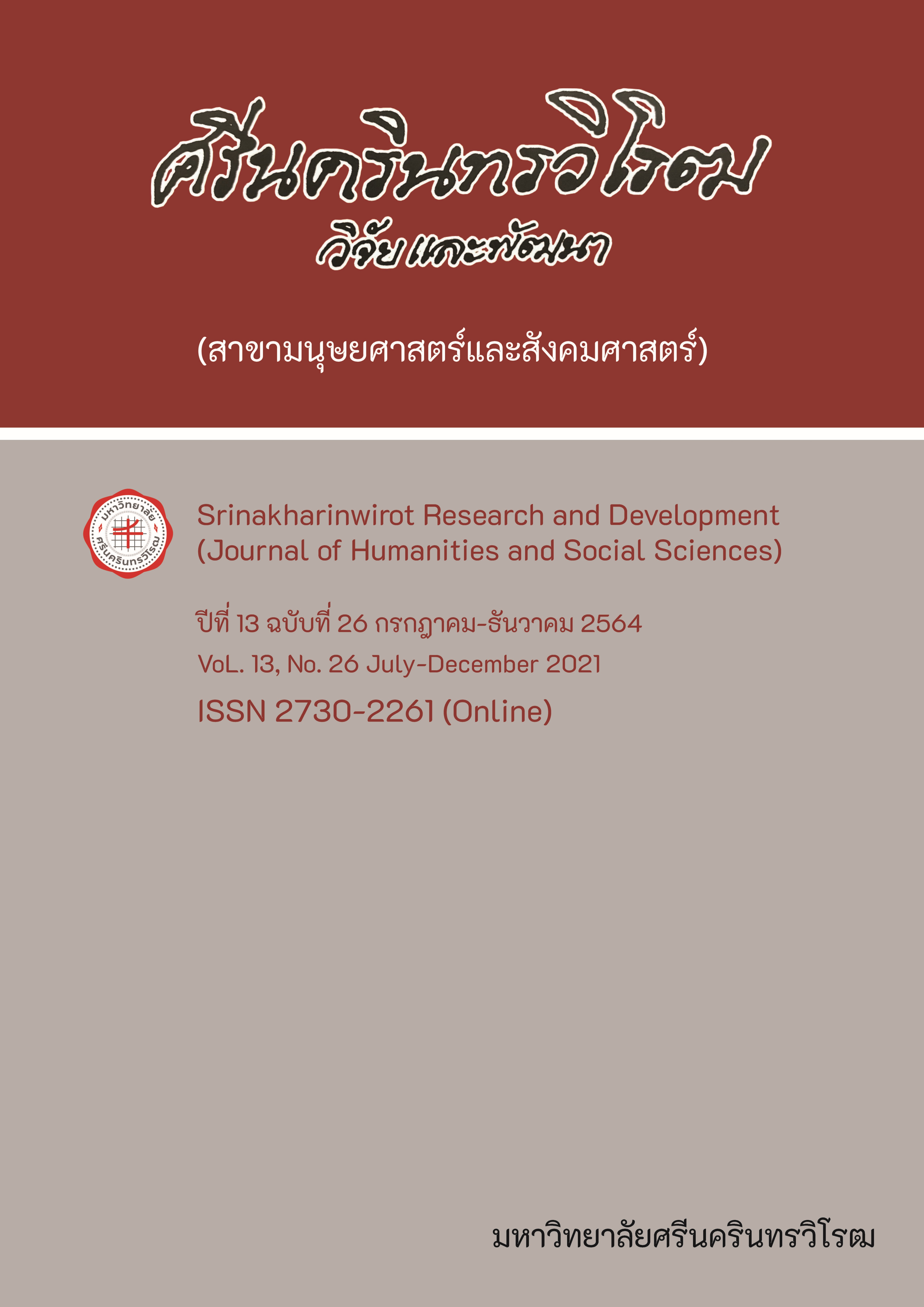PROCESSES OF DEVELOPING THAI CHOIRS TO INTERNATIONAL STANDARDS : A GROUNDED THEORY
Keywords:
Potential Development, Choirs, International Competition, Theory Development, Grounded TheoryAbstract
The aim of this research was chiefly to formulate a grounded theory in order to find the pattern behind phenomenon emerging from the processes of developing the capabilities of Thai choirs to international standard. The phenomenon had affected three Thai choir Suanplu Chorus, Thai Youth Choir and Chulada Choir to achieve gold medals in every international music competition that they had entered. The research was conducted by in-depth interviews with conductors of those three choirs, a focus group discussion from 27 representatives of each choir, and a participative observation in order to cooperatively formulate and fine-tune the theory. The research revealed that the grounded theory in developing capabilities of Thai choirs was a complex procedure involving many parties including choir director, conductor, choir management team, and choir members. A guideline in developing Thai choirs consisted of: 1. setting explicit goals to participate in music competition 2. building confidences among members in the choir 3. effective studying of competition criteria by conductor and communicating the criteria to all members 4. designing a clear practice of rehearsal planning to achieve a maximum efficiency 5. developing competency of all singers by considering a personal vocal training both individual and ensemble technique in order to meet the established standard. In addition, other auxiliary factors were needed to support the choirs including 1) the factor related to funding to support all related activities and expenses of the choirs 2) the factor concerning the supports from family, friends, and work or other affiliations of the singers 3) the factor relating to the audience of the performance.
Downloads
References
มานิจ ชุมสาย. (2498). ประวัติการศึกษาภาคบังคับในประเทศไทย. กรุงเทพฯ: กองการสัมพันธ์ต่างประเทศ กระทรวงศึกษาธิการ.
วิชฏาลัมพก์ เหล่าวานิช. (2556). กระบวนการกลายเป็นชายขอบของวิชาดนตรีในหลักสูตรการศึกษาข้ันพื้นฐาน: วิธีศึกษาแนวโบราณคดีความรู้. ปรัชญาดุษฎีบัณฑิต (ดนตรีศึกษา). นครปฐม: วิทยาลัยดุริยางคศิลป์ มหาวิทยาลัยมหิดล.
กมลา ชิตช่าง. (2541). การเรียนเปียโนของผู้หญิงในสังคมไทย. ศิลปศาสตรมหาบัณฑิต (วัฒนธรรมศึกษา). นครปฐม: มหาวิทยาลัยมหิดล.
ปิยนาถ บุนนาค, และคณะ. (2548). มโนทัศน์ของมาตรฐานและคุณภาพการศึกษาตั้งแต่รัชกาลพระบาทสมเด็จพระจุลจอมเกล้าเจ้าอยู่หัว ถึงสิ้นยุคสมบูรณาญาสิทธิราชย์ พ.ศ. 2411-2475. กรุงเทพฯ: สำนักงานรับรองมาตราฐานและประเมินคุณภาพการศึกษา (องค์การมหาชน).
André de Quadros. (2012). The Cambridge companion to choral music. New York: Cambridge University Press.
ชาย โพธิสิตา. (2556). ศาสตร์และศิลป์แห่งการวิจัยเชิงคุณภาพ. พิมพ์ครั้งที่ 6. กรุงเทพฯ: อมรินทร์ พริ้นติ้ง แอนด์ พับลิชชิ่งจํากัด (มหาชน).
Egon G Guba, & Yvonna Lincoln. (1989). Fourth generation evaluation. 1st ed. New York: SAGE Publishing.
Judy Russell Arthur. (2002). Experienced teachers use of time in choral rehearsals of beginning and advanced choirs. Dissertation, Ph.D. (School of Music). Florida: The Graduate School The Florida State University School of Music.
Anita Davis. (1993). Performance ratings and analysis of teaching during choral rehearsals. Dissertation, Ph.D. (Music Education). Florida: The Florida State University.
Derby Sandra Elizabeth. (2001). Rehearsal of repertoire in elementary, middle, and high school choirs: How teachers effect change in student performance. Dissertation, Ph.D. (Music Education). Austin: The University of Texas.
Fredna Howard Grimland. (2001). The characteristics of teacher–directed modeling evidenced in the practices of three experienced high school choral directors. Dissertation. Ph.D. (Music Education). Taxas: University of North Texas.
Hunsaker Tracy Caldwell. (2007). Processes and criteria of nationally recognized high school choral directors in the selection of performance literature. Dissertation, Ph.D. (Philosophy). Florida: University of Florida.
Johnson Brandon Paige. (2003). Elements of excellence: A study of musical and non–musical factors common within non–conservatory college and university choral programs recognized for excellence. Dissertation, Ph.D. (Musical Arts). Arizona: The University of Arizona.
Levi Robert Michael. (1986). The relationship of selected variables to successful choral programs. Dissertation, Ph.D. (Music Education). New York: University at Buffalo.
Morgan Ronald. (1992). A study of a director’s behaviors and his students’ perceptions in a high school choral ensemble (Doctoral dissertation). Dissertation, Ph.D. Illinois: Northwestern University.
Rhoads Mark Durward. (1990). Decision–making in the choral rehearsal: A study of five outstanding
high school choral directors using stimulated recall. Dissertation, Ph.D. (Music Art). Oregon: University of Oregon.
Wright Gary Kenneth. (1996). A case study of an exemplary choral program: Non–musical issues of excellence. Dissertation, Ed.D. California: University of the Pacific.
Bonnie L Jenkins. (2005). Beautiful choral tone quality rehearsal techniques of a successful high school choral director. Dissertation, Ph.D. (Teaching and Curriculum). Columbia: University of Missouri.
วิชฏาลัมพก์ เหล่าวานิช, และมนสิการ เหล่าวานิช. (2558). กระบวนการถ่ายทอดความรู้ทางดนตรี ของอาจารย์รามอน โมลินา ลิฮาวโก จูเนียร์ (Ramon Molina Lijauco, Jr.) ในการพัฒนาศักยภาพของคณะนักร้องประสานเสียงตัวแทนประเทศไทย เพื่อเข้าร่วมการแข่งขันขับร้องประสานเสียงโลก World Choir Game 2014 : กรณีศึกษา คณะนักร้องประสานเสียง สวนพลู และคณะนักร้องประสานเสียงจุฬดาร์ โรงเรียนสาธิตจุฬาลงกรณ์มหาวิทยาลัย ฝ่ายมัธยม. กรุงเทพฯ: กระทรวงวัฒนธรรม.
Gary D Funk. (1982). Visual imagery: Illuminator of the expressive content in choral music. c. Unpublished DMA Dissertation. Arizona: Arizona State University.
Overturf Marilyn Sherman. (1985). Implementing concepts of vocal sound: Rehearsal approaches of four conductors of outstanding high school choirs. Dissertation, Ph.D. (Music Education). Florida: Florida State University.
James C McKinney. (1994). The diagnosis and correction of vocal faults. Nashville, TN: Genevox Music Group.
Clifton Ware. (1998). Basics of Vocal Pedagogy: The Foundations and Process of Singing. New York: McGraw-Hill.
Pamela Dayle Hopton Fiocca (1986). A descriptive analysis of the rehearsal behaviors of selected exemplary junior high and middle school choir directors (teacher effectiveness). Dissertation, Ph.D. (Philosophy). Ohio: The Ohio State University.
Olu Ojo. (2012). Influence of Organizational Culture on Employee Work Behavior. International Journal of Contemporary Business Studies, 3(11), 46-57.
พิศมัย ทิพย์สมบูรณ์. (2552, กรกฎาคม-ธันวาคม). ภาวะผู้นํา สมรรถนะ การมุ่งเน้นทรัพยากรบุคคล และพฤติกรรมการทำงาน. วารสารศรีนครินทรวิโรฒวิจัยและพัฒนา (สาขามนุษยศาสตร์และสังคมศาสตร์), 1(2), 78-95.
Bernard M Bass. (1985). Leadership and Performance Beyond Expectations. New York: Free Press.
ศิรภัสสรศ์ วงศ์ทองดี. (2559). การพัฒนาทรัพยากรมนุษย์. พิมพ์ครั้งที่ 3. กรุงเทพฯ: สํานักพิมพ์แห่งจุฬาลงกรณ์มหาวิทยาลัย.
Dwight Cornell Basham. (1999). The history of the Eastern Mennonite High School touring choir: 1917-1981. Dissertation, M.A. (Curriculum and Instruction). Virginia: Virginia Polytechnic Institute and State University.
มนสิการ เหล่าวานิช, และวิชฏาลัมพก์ เหล่าวานิช. (2561). พระอัจฉริยภาพทางดนตรีในพระบาทสมเด็จพระปรมินทรมหาภูมิพลอดุลยเดช บรมนาถบพิตร กรณีศึกษา การบันทึกเสียง การขับร้องประสานเสียง บทเพลงพระราชนิพนธ์ที่มีคำร้อง จำนวน 41 บทเพลง. ทุนอุดหนุนการวิจัยจากโครงการศิลปวัฒนธรรมของบริษัทไทยเบฟเวอเรจ จํากัด (มหาชน) ประจำปีงบประมาณ 2560.
Downloads
Published
How to Cite
Issue
Section
License
Srinakharinwirot Research and Development Journal of Humanities and Social Sciences is licensed Under a Creative Commons Attribution-NonCommercial-NoDerivs 4.0 International (CC-BY-NC-ND 4.0) License, Unless Otherwise Stated. Please Read Journal Policies Page for More Information on Open Access, Copyright and Permissions.



